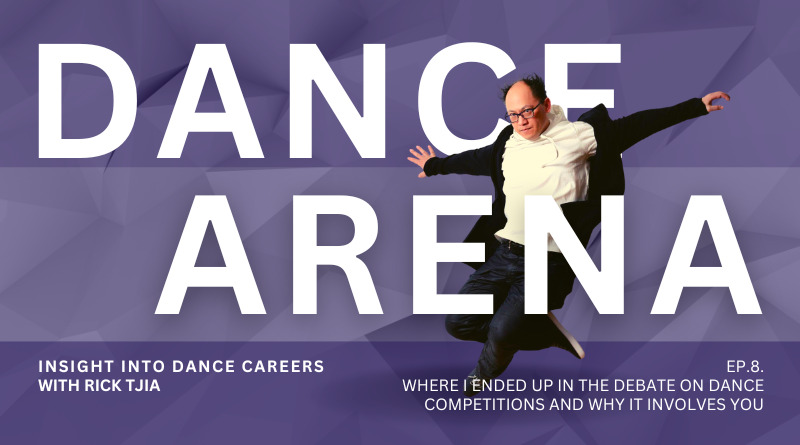Dance Arena Ep. 8. – Where I Ended Up in the Debate on Dance Competitions

Since my youth, I have struggled with the idea of formal competition in artistic disciplines. I have gone through phases of being uncomfortable with the idea of competing in a domain like art, an activity where the main point is to express, get a message across, to connect with other human beings. So competition? Competing with other artists as to who can better connect with an audience? Who can do the most pirouettes? The whole idea seemed ludicrous to me, and I wanted no part of it.
Over the years I have seen many a competition. Most of my career being in dance, obviously I have seen more dance competitions than any other type. I’ve been on juries, I’ve scouted dancers from them, I have taught workshops at competition events.
And over those years I have for sure seen the negative side of competition: the obsession with tricks, the obsession with winning, cutthroat attitudes towards adversaries, teams glaring at their rivals, schools prohibiting their students from mingling with students from other schools. I have seen politics enter into medal decisions, I have seen personal vendettas play a role in areas where they should simply have no place.
Some competitions encourage this behaviour, some teachers encourage it, and yes – some parents encourage it as well. Survival of the fittest; only the winners count for anything.
So that should clinch the argument, yes? Competition brings out the negative and has no place in the world of art.
But what I have also seen at competitions is this: I’ve seen dancers come together for better or for worse, I’ve seen people learn about comrades from different countries, different cultures, and different ways of thinking, I have seen people from opposite ends of the world become lifelong friends. I have seen people stand up for each other. I have seen a certain magic happen that only humans can conjure.
I’ve seen people learn things. Great, worldly, professional, emotional, technical…things. Important things. Inasmuch as I have seen negativity in some competitions, I have seen mutual love, understanding, and education arise from others. I have seen eyes opened, and most important of all, I have seen lives changed forever.
At some point afterwards, young competitors will enter the professional world. They will leave their teachers behind, their mentors, and for the most part their parents as well. They will begin to realize that life is, in itself, all about competition: we compete for jobs, for scholarships, for lodging, for food, for love. We compete for a place on the bus, for God’s sake. Everything is a competition – but you know what? We also eventually learn that it is not all a huge free-for-all, cutthroat, nasty, evil daily existence. We accept the competition and we live it without thinking twice. And guess what – because of it, we learn things. We learn great, worldly, professional, emotional, technical…things. Important things.
We live. We connect with other human beings. Like it or not, competition has played a role in all of that. And if done right, we learn through those connections that the value of competition is in what we take home with us from the process. After all, a winner’s trophy is just a piece of stone, plastic, and glass.
And so I look back on the argument of formal competition in art and I understand that competition does have its place in the artistic world. But it has to be done right. It has to be done so that we can push ourselves, so that we can learn who we are, and so we learn that although we are sometimes alone in competition, we are not alone in the global scheme of things.
And most important of all, that we will always have something to learn from other human beings, especially those who do not think like ourselves.
For me the argument has come full circle. It has taken many years to get there, but hey – years are just time. Time is just a dimension; one that we never seem to have enough of, but one that we spend specifically in the hopes of receiving some sort of insight in return.
And as such, I continue to accept requests to participate on competition juries – provided that the conditions are right. For when they are, human magic happens – and I do want to be a part of that.
Back to Home
Editor's Note: At StageLync, an international platform for the performing arts, we celebrate the diversity of our writers' backgrounds. We recognize and support their choice to use either American or British English in their articles, respecting their individual preferences and origins. This policy allows us to embrace a wide range of linguistic expressions, enriching our content and reflecting the global nature of our community.
🎧 Join us on the StageLync Podcast for inspiring stories from the world of performing arts! Tune in to hear from the creative minds who bring magic to life, both onstage and behind the scenes. 🎙️ 👉 Listen now!
